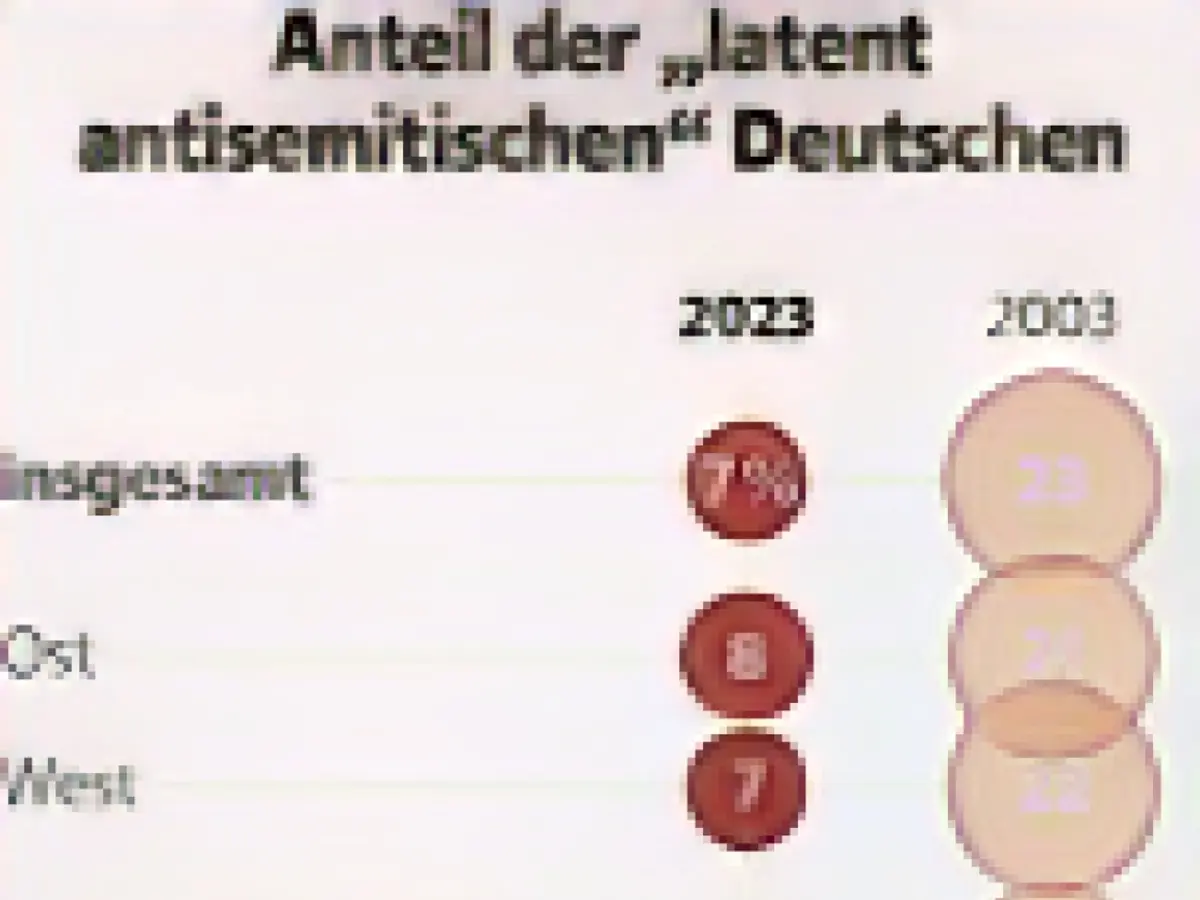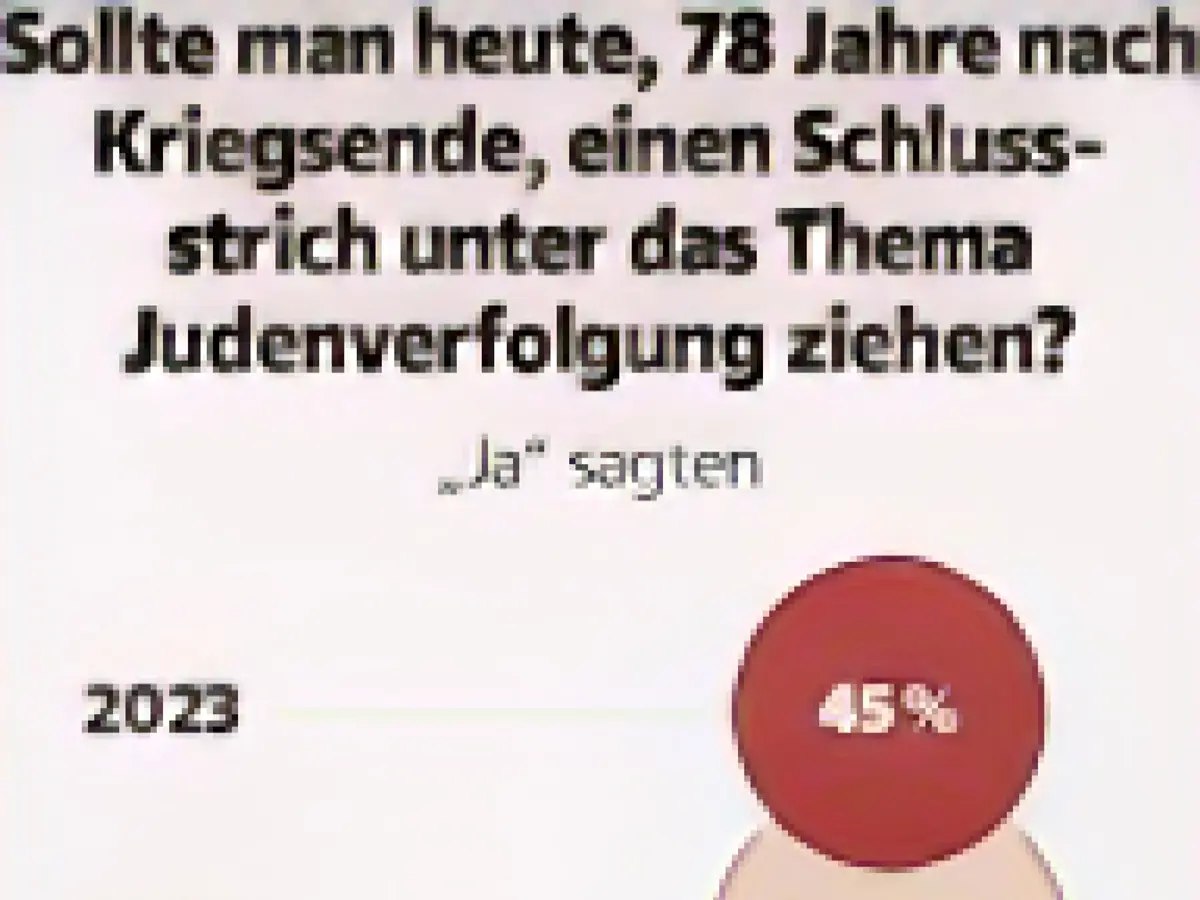Exclusive survey - Anti-Semitic attitudes are declining - but Jews are experiencing a wave of hatred
Arson attacks on a synagogue, hate slogans at anti-Israel demonstrations and Stars of David spray-painted on residential buildings: Since the Hamas terror attack, hardly a day has gone by in this country without reports of hostility and attacks against Jews.
More than half of Germans believe that attitudes towards Jews have worsened in recent years. The good, perhaps surprising news is that they are wrong. In any case, approval of openly anti-Semitic distortions and clichés has fallen over the past 20 years. This is shown by a representative survey conducted by the opinion research institute Forsa at the end of November on behalf of stern magazine.
Forsa had already asked the same questions in 2003, so the results are comparable. 24 percent still believe that Jews today are trying to take advantage of the National Socialist past. In 2003, the figure was 38 percent. 14 percent believe that the Jews have too much influence in the world. And almost half of those surveyed believe that a line should be drawn under the issue of the persecution of the Jews.
Anti-Semitism is particularly pronounced among AfD supporters
Among older respondents, approval ratings are consistently higher than among younger respondents. There is also a clear trend in the level of education: the lower the education, the higher the approval of anti-Semitic statements. This is just as true today as it was 20 years ago. Anti-Semitism is particularly pronounced among AfD supporters.
Around two thirds of respondents believe that Jews are tradition-conscious, business-minded and stick together. Attributes that are not negative in themselves, but nevertheless point to the stereotype of money-hungry, conspiratorial "world Jewry". In contrast, only a third believe that Jews are tolerant or humorous.
The proportion of "latently anti-Semitic" Germans has fallen from 23% to 7%. One of Forsa's explanations is that many old Nazis and Germans who were socialized with National Socialist ideology as children have died in the past 20 years. The young tend to be more cosmopolitan than the old.

A fundamental difficulty in prejudice research is the phenomenon of so-called social desirability. Particularly when it comes to sensitive issues, some respondents tend to give an answer that they assume is socially accepted. Forsa points out that this possible distortion effect was equally present 20 years ago, meaning that the values are comparable. But when was the lament that one should no longer say this and that louder than today? When was the last time unrestricted solidarity with Israel and the Jews in Germany was so emphasized in the media, politics and civil society?
The tendency for openly anti-Semitic statements to receive less approval could be good news if the reality on the streets were not completely different; if Jews were not living in fear.
An average of 29 anti-Semitic incidents per day
The number of anti-Semitic crimes in Germany has risen significantly since the Hamas attack on Israel. The Federal Criminal Police Office recorded 680 anti-Semitic crimes between October 7 and November 23. The potential for escalation is high, warns the authority.
In the first few weeks after the Hamas massacre in Germany alone, the Research and Information Center on Anti-Semitism (RIAS) recorded 994 anti-Semitic incidents, including attacks, damage to property and forms of extreme violence. On average, there were 29 incidents per day.
How does that fit together?
"There is a greater sensitivity in society as a whole to certain forms of anti-Semitism," says Marco Siegmund from RIAS. "Opinion polls are important for researching anti-Semitism, but they are only one piece of the puzzle." At RIAS, they do not monitor attitudes, but anti-Semitic incidents. "You have to put these figures side by side."

The Jewish communities are extremely unsettled by the sharp rise in anti-Semitic incidents since October 7, says Siegmund. "There is great concern for their own safety."
Opinion polls alone can only reflect the reality of anti-Semitism to a limited extent. Forsa only surveyed German citizens, but anti-Semitic crimes are also committed by foreigners living here. And it makes a difference whether someone thinks and speaks this way on their own, in their circle of friends or at the often-troubled regulars' table. Or whether they are prepared to give free rein to their hatred.
The Berlin anti-Semitism commissioner Samuel Salzborn used to conduct his own academic research into hatred of Jews. He says that for some years now, a trend has been observed that he calls the "intensification of anti-Semitism": those who share anti-Semitic positions are more willing to articulate them publicly. "The hard core of anti-Semites is becoming more radical, more brutal and possibly more violent," says Salzborn.
That is why it is not enough not to hold anti-Semitic positions; the majority must also actively position themselves against them, he says. "Otherwise, those who become more aggressive will have a much greater influence on public debates."
Read also:
- Unanimous decision: faster wolf culls possible
- No Christmas peace with the British royals
- No Christmas peace with the British royals
- No Christmas peace with the royals
- Despite the declining anti-Semitic attitudes, anti-Semitic incidents in Germany are on the rise, with the Federal Criminal Police Office recording 680 anti-Semitic crimes between October 7 and November 23.
- The AfD party in Germany has been identified as a group with particularly pronounced anti-Semitic attitudes, according to the Forsa survey.
- The Research and Information Center on Anti-Semitism (RIAS) recorded an average of 29 anti-Semitic incidents per day in the first few weeks following the Hamas attack in Germany.
- The good news from the Forsa survey is that approvals of openly anti-Semitic distortions and cliches have fallen over the past 20 years in Germany, from 24% to 7%.
- Germany's Headlines have been filled with reports of hostility and attacks against Jews since the Hamas terror attack, including arson attacks on synagogues, hate slogans at anti-Israel demonstrations, and Stars of David spray-painted on residential buildings.
Source: www.stern.de







